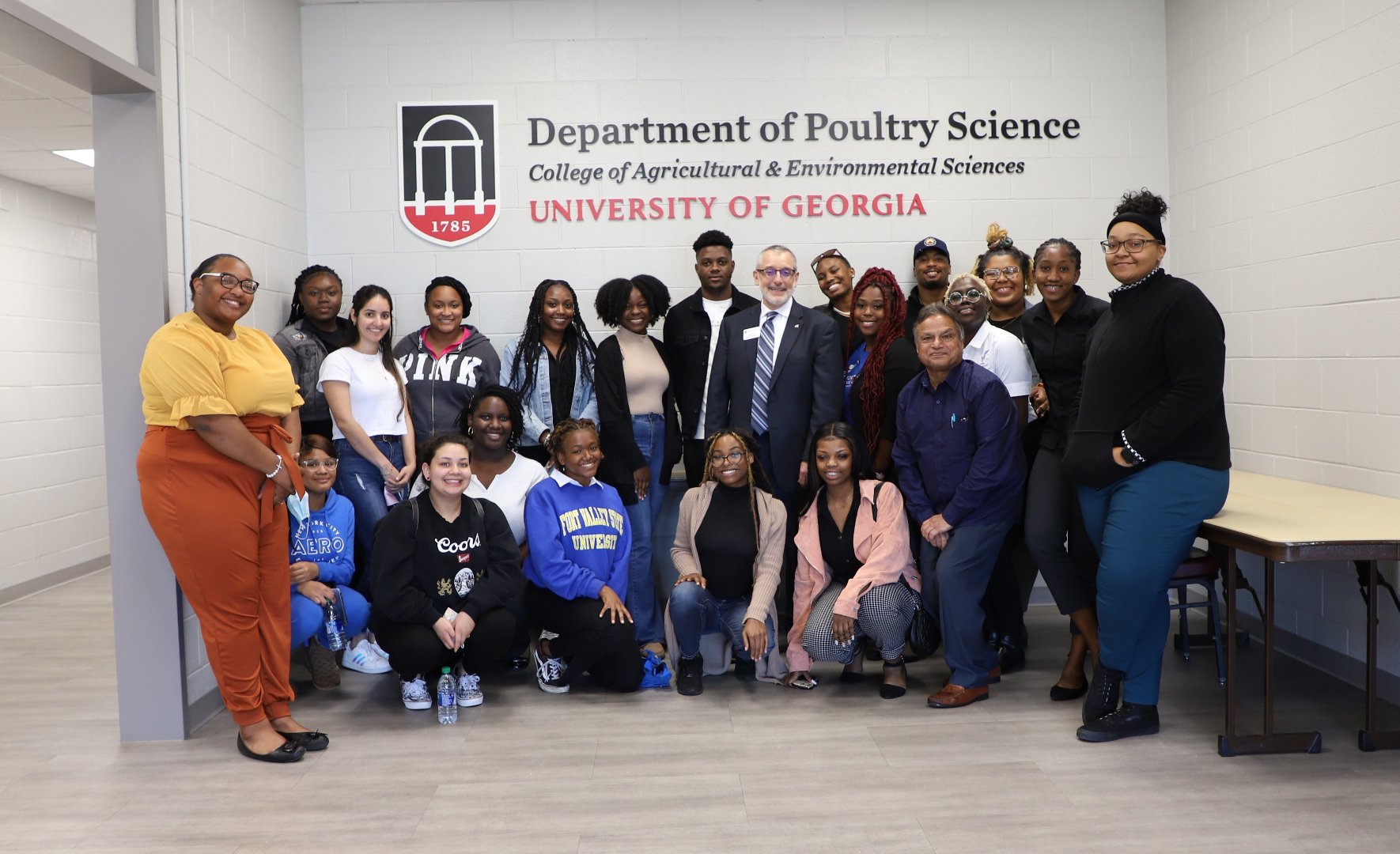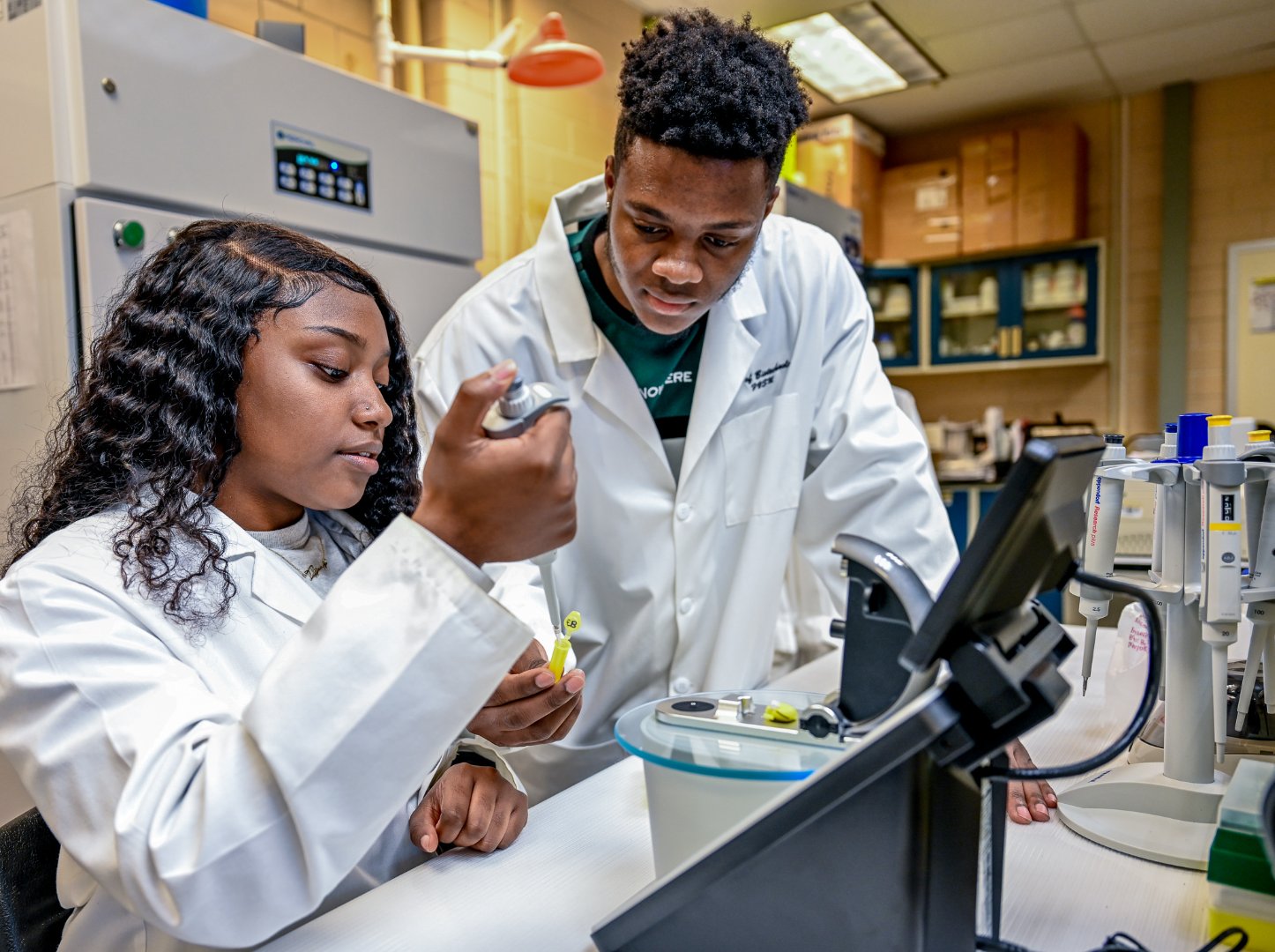Two Fort Valley State University plant science-biotechnology sophomores expanded their knowledge in research and learned the necessary steps to apply for graduate school after visiting the University of Georgia’s College of Agricultural and Environmental Sciences.
Tiffany James and Jevon Clarke, along with 21 of their peers, took a field trip to Athens in November 2021. This academic enrichment activity, supported by the National Science Foundation (NSF) S-STEM, HBCU-UP and FVSU’s Department of Education’s Minority Science and Engineering Improvement Program (MSEIP), exposed the students to biotechnology concepts. It also trained them to apply those concepts by learning hands-on techniques in higher education and professional school.
Students toured the Animal and Dairy Sciences research facilities, UGA Plant Breeding and Genetics Department and the campus greenhouses. They also learned about the summer research opportunity and graduate program at UGA. During lunch, students shared their academic and research experience at FVSU and future career plans with Dr. Nick T. Place, dean of the College of Agricultural and Environmental Sciences, and faculty and staff from the college.
Dr. Sarwan Dhir, an FVSU professor of plant biotechnology, said exposing youths to STEM disciplines and careers as undergraduates is more important than ever.
“The demand for STEM education is increasing both at the federal and local levels as the U.S. competes to reassert its position as a global leader in the science and technology fields,” he said. “The visit at UGA also helped us to develop the collaboration to place five FVSU biotechnology scholars this year.”

As one of those scholars, 20-year-old James said the experience was informational regarding the university’s many graduate programs. “It was cool to see how things are done at a different school,” said the Grayson, Georgia, native, who plans to attend dental school after graduation.
For Clarke, the trip to UGA was his first time visiting another institution since becoming a Wildcat.
“I had an opportunity to learn more about the next steps I will take in my career. It was good that they took the time to go through the process of getting into a master’s program,” he said. “When we visited the plant science department, it was eye opening to see how they do it on a much larger scale. We also learn the same techniques that they do there, which was good to see.”
Both students are looking forward to furthering not only their education but also their careers.
This summer, James will participate in the NSF’s Research Experience for Undergraduates-Site: Fungal Genomics and Computational Biology at UGA, for 10 weeks. The FVSU 1890 Scholar said, “I've always liked the opportunity to learn more. This is my first year in this major, so this would be a good learning experience for me and an opportunity to meet new people and be in a new environment.”
To get accepted into dental school, James said she needs some experience in the lab, which the summer internship will provide that exposure.
Clarke, who is also an FVSU 1890 Scholar, wants to pursue a master’s degree in plant breeding.
“Being at UGA sparked my interest because I grew up on a farm in Jamaica,” he said. “I have always been inspired to be in the agriculture field since I was young.”
The 20-year-old, who moved to Orlando, Florida, in the seventh grade, said not only did his upbringing inspire him to pursue an agricultural degree, but he learned more about the programs after becoming a Wildcat. When meeting Dhir, he said the FVSU mentor gave him the opportunity to work as a lab assistant because of his interest in plant breeding.
This summer, the young scientist will participate in UGA’s Research and Extension Experiences for Undergraduates (REEU) program to gain more experience in plant breeding.
“Being at UGA this summer would help add to my resume and help me be more informed about the plant breeding and genetics part of plant science,” Clarke said. “We face daily factors with different types of plants and crop breeding. If I could be of service to my community and environment with that, it would be very good.”
Clarke and James encourage other students to attend FVSU. Clarke said he initially had no idea about the 1890 Land-Grant University. He was surprised about the endless opportunities offered in the College of Agriculture, Family Sciences and Technology, including scholarships, cutting-edge lab experience and mandatory scientific presentations at the national meeting for plant science-biotechnology students.
“They create strong career paths for agricultural majors,” he emphasized.

